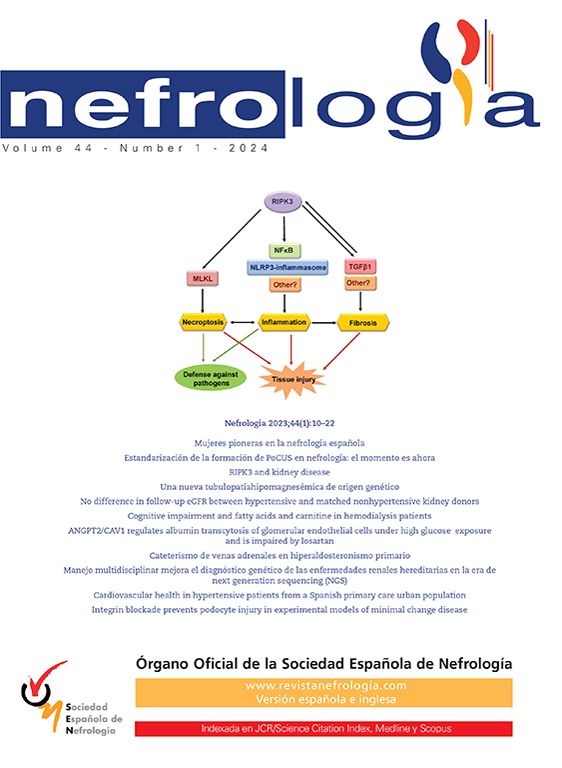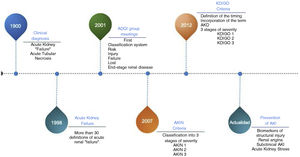We recently led a multinational initiative to standardise our nephrology nomenclature in Spanish,1 following the Kidney Disease Initiative Global Outcomes (KDIGO) Consensus Conference on Kidney Function and Disease Nomenclature.2 Among other aspects, we also highlighted the existence of a certain discrimination of classical terminology of Latin origin, such as the adjective “renal”.3 It was also of great interest that the “Registro Latinoamericano de Diálisis y Trasplante Renal” [Latin American Registry of Dialysis and Renal Transplantation] and the Acute Kidney Injury Committee of the Sociedad Latinoamericana de Nefrología e Hipertensión (SLANH) [Latin American Society of Nephrology and Hypertension] also published a proposal for an Ibero-American consensus on nomenclature harmonisation.4
In the aforementioned initiative,1 which is primarily focused on concepts essentially oriented towards chronic kidney disease (CKD), we have already pointed out that the introduction of new Anglo-Saxon terminology such as Acute Kidney Injury (AKI) has led to a clear dispersion in Spanish (from "fallo" or "falla", "alteración", "fracaso", "insuficiencia", "daño", "lesión" or even "injuria"-an obvious anglicism).5 The term "fallo renal" or "falla renal" (for the English "failure") contains contradictions in the KDIGO and SLANH guidelines' own definitions (in one defined simply as duration of renal disease > three months and in the other as equivalent to "«fracaso» renal" or CKD G5 (with or without renal replacement therapy).2,4 We had already emphasised that "«fracaso» renal agudo (FRA)", according to the KDIGO guidelines,6 would be equivalent to AKI stage 3, so that the Spanish terms "daño, injuria, lesión, fallo (o falla) renal agudo" would not necessarily mean "«fracaso» renal". It was also suggested that "daño renal" or "injuria renal" should noy be used (despite the names used by some committees) for various reasons, ranging from a lack of tradition to the fact that the term AKI is a purely cosmetic change, still defined by imprecise renal function and not by objective, function-independent markers of structural damage. It is also worth noting the introduction of the international concept of acute kidney disease (AKD) (decline in renal function more than seven days and less than three months), which refers by consensus to the transition after an acute episode towards the established criteria of CKD (Table 1).
Accepted terminology for the timing and severity of the acute kidney injury (AKI), chronic kidney disease (CKD) continuum. The term "acute kidney insufficiency" would be a term which, although old, would encompass both the also proposed concept of "impairment" of renal function and the different stages of severity. The grading of severity could also be called an "estadio" (stage) as the Real Academia Española (RAE) [Royal Spanish Academy that publishes the Spanish dictionary] describes it as the "period or phase of a process".
| Accepted terminology | ||||
|---|---|---|---|---|
| Acute kidney injury | Acute kidney disease | Renalrecovery | Chronic kidney disease | |
| Time since onset | <7 daysa | ≥7 daysa | Early recovery (<7 days)bLate recovery (≥7 days)b | ≥3 monthsa |
| Severity | Grade 1 | Grade 1 | Grade 3 | Grade 1 |
| Grade 2 | Grade 2 | Grade 2 | Grade 2 | |
| Grade 3 | Grade 3 | Grade 1 | Grade 3a and 3b | |
| Grade 4 | ||||
| Grade 5 | ||||
Therefore, we understand that the conceptual evolution of the current model of acute kidney injury (AKI) (Fig. 1) has not only allowed new definitions to be introduced into the nomenclature, but has also broadened our knowledge of new mechanisms of kidney injury, which is why we believe that the early homogenisation of the terms "disfunción, lesión, fracaso renal agudo" is essential.
This urgent call for attention is also linked to the existence of the "Acute Renal Failure" group of the Sociedad Española de Nefrología [Spanish Society of Nephrology], which has recently been interested (among other issues) in better understanding the role of nephrology in the management of kidney replacement therapies in intensive care units, but which should also take into account terminologically the broader and earlier concept of AKI. In fact, both patients with acute kidney function impairment [AKI 1-3 or "FRA" (AKI 3)] and AKI, as well as patients with impaired renal function without structural damage ("pseudo worsening renal function" or "permissive AKI", in Anglo-Saxon terminology) are possible.7,8 Therefore, and in order to respect widely used terms, we would like to stress that the term "fracaso renal agudo" and its acronym "FRA" should be reserved only for patients with KDIGO criteria (AKI 3). Given that creatinine is the only widely available biomarker, the term "insuficiencia renal aguda" (IRA [acute renal insufficiency], in its different stages 1-2-3, based on the international KDIGO classification)6 would be a term that, although old, would encompass both the concept of "impairment" of renal function and the different stages of severity. However, the acronym "IRA" could be confused with "insuficiencia respiratoria aguda" [acute respiratory insufficiency]. The term "LRA" ([lesión renal aguda] acute kidney injury; AKI) is increasingly used because it is know that structural damage precedes functional impairment (subclinical AKI, renal "angina" or acute kidney stress).9
Finally, as we have already mentioned,1 it is important to highlight that this dispersion (or, on the contrary, homogenisation) in the nomenclature takes on great relevance today when we think about the efficiency, not only of our literature searches, but, more importantly, when we anticipate and think about the use of the new tools of Artificial Intelligence/Machine-Learning and the exploitation of Big-Data in this context. In addition, we should already be working on increasing the importance of nomenclature, not only in terms of defining AKI, but also in terms of properly agreeing concepts for "recuperación renal" [renal recovery] based on decreasing severity or speed of recovery, with assistance and epidemiological objectives in mind, even taking into account that a decrease in creatinine to baseline values does not always mean complete return to normal.10
Conflicts of interestThe authors have no conflicts of interest.








